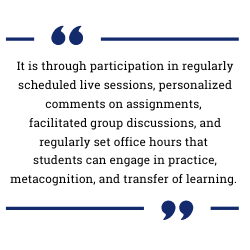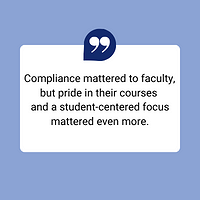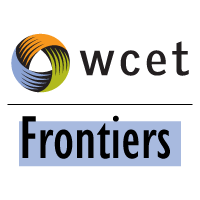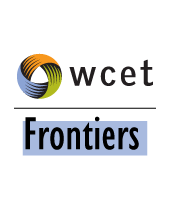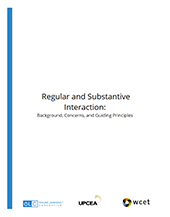Regular & Substantive Interaction
For the purposes of determining institutional eligibility for federal financial aid, Congress created a delineation between the definitions of “distance education” and “correspondence education.” This resulted from a consumer protection concern, as students in the 1990’s experienced financial aid fraud related to correspondence education. Additionally, there was interest in assuring aid eligibility for those taking distance education courses, as that modality was growing.
Institutions offering more than 50 percent of their total course offerings via correspondence or enrolling more than 50 percent of their students in correspondence courses are not eligible to participate in Title IV financial aid programs. Even if the institution is eligible, students enrolled in correspondence programs are limited to a half-time federal Pell Grant award.
The notion of “regular and substantive interaction” in the definition of a “correspondence course” highlights both the focus on interaction and on the person and/or organization who initiates the interaction:
- “Interaction between instructors and students in a correspondence course is limited, is not regular and substantive, and is primarily initiated by the student.”
Unfortunately, Congress did not supply a more comprehensive description of what actions constitute “regular and substantive interaction.” While the Department of Education provided some guidance, many questions remained. In 2016, Van Davis and Russ Poulin reviewed Departmental guidance and findings against institutions to (unofficially) interpret the requirements.
In 2021, the Department enacted a more robust “distance education” definition with more specifics on what is required, including:
- The instructor (or instructors) meets the “qualifications for instruction established by the institution’s accrediting agency.”
- “Substantive” interaction includes at least two of the following:
- “Providing direct instruction;”
- “Assessing or providing feedback on a student’s coursework;”
- “Providing information or responding to questions about the content of a course or competency;”
- “Facilitating a group discussion regarding the content of a course or competency; or”
- “Other instructional activities approved by the institution’s or program’s accrediting agency.”
- “Regular” interaction includes both:
- “Providing the opportunity for substantive interactions with the student on a predictable and scheduled basis…” and
- “Monitoring the student’s academic engagement and success and ensuring that an instructor is responsible for promptly and proactively engaging in substantive interaction with the student when needed on the basis of such monitoring, or upon request by the student.”
While the new 2021 definition provides more specifics than in previous versions of the regulation, some questions remain regarding the interpretation and expected actions that an institution should take to meet the requirements. WCET will continue to follow this topic and seek guidance for its members. See resources below for the latest from WCET.
Where to start? For the quickest update on RSI and the most recent interpretative analysis from WCET, please read:
- Regular and Substantive Interaction Refresh: Reviewing & Sharing Our Best Interpretation of Current Guidance and Requirements
- Regular and Substantive Interaction Update: Where Do We Go from Here?
Further, other oversight entities may have comparable or additional standards relating to RSI and/or instructor contact and engagement (e.g., California Community Colleges). Be sure to check your state, accreditor, or institutional standards for any similar requirements.
WCET Resources
WCET Events
WCET & SAN Member Policy Series: Practical Approaches to Compliance, Part 1
A complimentary series of webinars for WCET and SAN Members In this two-part virtual series, attendees heard from other WCET and WCET|SAN members who shared their practical approaches to managing regular and substantive interaction and professional licensure at...
WCET & SAN Member Virtual Policy Series
A complimentary series of webinars for WCET and SAN Members In this three-part series, WCET’s policy experts guided members through some of the hot policy topics facing institutions today. Live captioning was provided by our sponsor, VITAC. Webinar recordings...
External Resources
For more information, contact:
Russ Poulin
Executive Director, WCET & Vice President for Technology-Enhanced Education, WICHE (retired)

